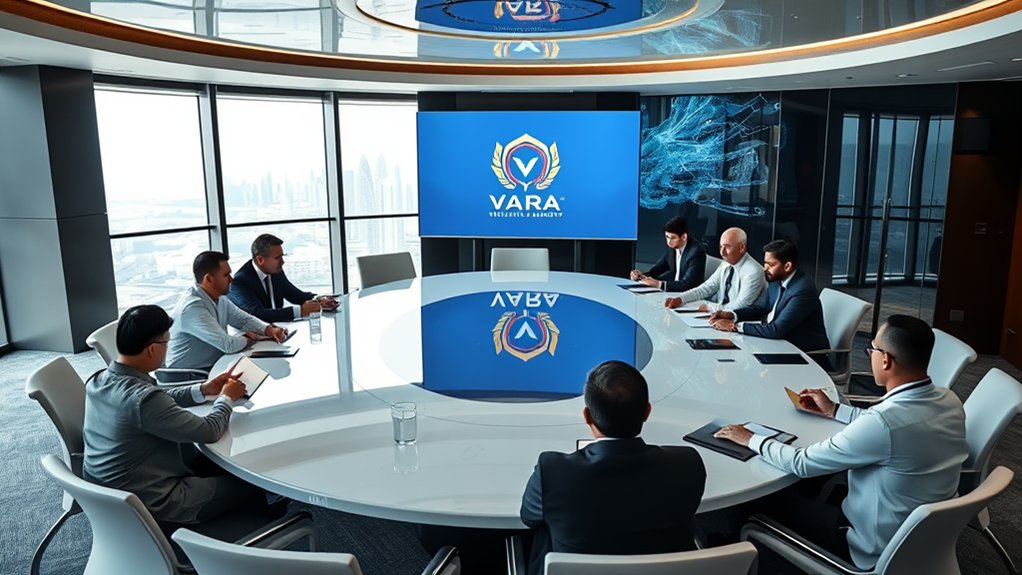Yes, foreign investors can apply for a UAE crypto license, benefitting from the nation's robust regulatory framework and diverse economic zones. By establishing a legal entity in areas such as the Dubai Multi Commodities Centre or Abu Dhabi Global Market, you can achieve 100% ownership and access streamlined licensing processes. The application demands a thorough business plan and adherence to Know Your Customer (KYC) and Anti-Money Laundering (AML) regulations. Additionally, regular audits guarantee compliance with evolving standards, safeguarding your investment. Exploring the specifics of the licensing process reveals additional insights into maximizing your venture's potential in the UAE market.
Understanding Cryptocurrency

As you explore the world of cryptocurrency, you'll find that it's a digital asset built on blockchain technology, enabling secure transactions without relying on banks or governments. This decentralized nature fosters innovative financial opportunities, allowing you to engage in various applications such as NFTs, payment gateways, and lending platforms. The market has surged, with around 10% of the global population owning cryptocurrencies by 2023. However, the regulatory environment greatly impacts your investments. Jurisdictions like Dubai are establishing frameworks to promote innovation while ensuring compliance with investor protection standards. For foreign investors, acquiring a UAE crypto license can facilitate entry into this burgeoning market, aligning with the necessary compliance requirements and fostering a secure investment landscape. Additionally, the UAE government actively supports cryptocurrency initiatives, creating a favorable environment for new entrants.
Overview of Crypto Licensing
Engaging in the cryptocurrency market requires understanding the licensing landscape, especially for foreign investors eyeing opportunities in the UAE. To operate legally, obtaining a crypto license in Dubai is essential, typically necessitating a minimum authorized capital of $13,600. Compliance with local regulations, including Know Your Customer (KYC) and Anti-Money Laundering (AML) protocols, is mandatory. The licensing process involves submitting a detailed business plan, documentation of founders, and passing due diligence managed by the Virtual Asset Regulatory Authority. Establishing your business within favorable zones, such as the Dubai Multi Commodities Centre, not only facilitates these processes but also allows access to a favorable tax regime, promoting a credible presence in the burgeoning cryptocurrency activities within the region. Additionally, understanding the regulatory framework is crucial for successfully navigating the licensing process.
Economic Zones for Licensing

In the UAE, various economic zones, such as the Dubai Multi Commodities Centre (DMCC) and the International Free Zone Authority (IFZA), provide tailored frameworks for obtaining a crypto license. Each zone comes with specific requirements and distinct advantages that cater to the diverse needs of foreign investors, enabling you to strategically position your cryptocurrency business. Understanding these licensing zones is essential for maneuvering the regulatory landscape and optimizing your investment potential in the UAE's burgeoning crypto market. Additionally, many of these zones offer 100% ownership of businesses, allowing foreign investors to retain full control over their operations.
Licensing Zones Overview
While exploring opportunities for obtaining a UAE crypto license, foreign investors will find several economic zones tailored to their needs. The Dubai Multi Commodities Centre (DMCC) stands out by offering a conducive environment for crypto businesses, allowing 100% foreign ownership and licenses for trading, mining, and advisory services. Meanwhile, the International Free Zone Authority (IFZA) partners with the Securities and Commodities Authority to streamline licensing for cryptocurrency exchanges and storage services, emphasizing compliance with local regulations. The Abu Dhabi Global Market (ADGM) boasts a robust regulatory framework designed specifically for virtual assets, ensuring a secure operational platform within the UAE's financial ecosystem. Each zone mandates specific documentation, including a business plan and adherence to Anti-Money Laundering regulations, guaranteeing compliance with UAE laws.
Specific Requirements Per Zone
To successfully navigate the process of obtaining a UAE crypto license, you'll need to understand the specific requirements for each economic zone. In the Dubai Multi Commodities Centre (DMCC), foreign investors benefit from 100% ownership of their crypto businesses, making it a compelling choice. Conversely, the Abu Dhabi Global Market (ADGM) mandates the submission of a detailed business plan that outlines your crypto operations, target audience, and financial projections. Meanwhile, the International Free Zone Authority (IFZA) simplifies the application process, allowing you to secure a crypto license with a minimum authorized capital of AED 10,000. Regardless of the zone, you must adhere to specific compliance requirements, including Anti-Money Laundering and Know Your Customer regulations, to successfully obtain your crypto license.
Requirements for Crypto License
To secure a crypto license in the UAE, you'll need to meet specific eligibility criteria that include registering a legal entity in a designated economic zone and demonstrating adequate capital. You must also prepare a thorough business plan and submit necessary documentation that outlines your compliance with local regulations, such as AML and KYC policies. Ensuring that your key management personnel have relevant experience will further enhance your application's credibility in the eyes of regulatory authorities.
Eligibility Criteria Overview
Obtaining a UAE crypto license requires foreign investors to meet specific eligibility criteria, guaranteeing compliance with local regulations. To begin, you must establish a legal entity in a designated free zone, such as Dubai's DMCC or ADGM, which are tailored for cryptocurrency businesses. A minimum authorized capital of $13,600 is required alongside a detailed business plan that outlines your services and operational strategies. Additionally, compliance with AML and KYC policies is mandatory, necessitating robust procedures to verify customer identities and monitor transactions effectively. You'll need to submit certified copies of founders' documents, including valid passports and proof of address. Finally, the relevant regulatory authority, such as VARA, will conduct a thorough review to ascertain all regulatory standards are satisfied before granting your crypto license.
Necessary Documentation Submission
When applying for a UAE crypto license, it's vital to prepare and submit several key documents to guarantee compliance with local regulations. Foreign investors must provide certified copies of the founders' documents, including valid passports and proof of address. Additionally, a thorough business plan detailing your services, revenue models, and financial projections is essential. To confirm compliance with Anti-Money Laundering (AML) and Counter-Terrorism Financing (CFT) regulations, you need to submit relevant policies and procedures. Furthermore, evidence of sufficient authorized capital, with a minimum requirement of $13,600, is mandatory. Finally, keep in mind that regular audits by the Virtual Asset Regulatory Authority (VARA) are required, necessitating documentation reflecting adherence to compliance standards throughout your operations.
#
Compliance With Local Regulations
Complying with local regulations is crucial for foreign investors seeking a crypto license in the UAE, as adherence guarantees legitimacy and operational success. To obtain a UAE crypto license, you must navigate the requirements set forth by the Virtual Asset Regulatory Authority (VARA) and other governing bodies. This includes submitting a detailed business plan outlining your proposed virtual asset activities and financial projections. Compliance with Anti-Money Laundering (AML) and Counter-Terrorism Financing (CFT) policies is necessary, necessitating thorough Know Your Customer (KYC) checks. Additionally, a minimum authorized capital of $13,600 is required, along with certified copies of the founders' documents. Regular audits by VARA guarantee ongoing compliance with these regulatory requirements, safeguarding your investment's integrity.
Role of VARA in Licensing

As you navigate the dynamic landscape of cryptocurrency in Dubai, understanding the role of the Virtual Asset Regulatory Authority (VARA) in licensing is essential. VARA oversees the licensing of all cryptocurrency businesses, ensuring compliance with local regulations while adhering to international standards. Its two-step licensing process demands that applicants present a thorough business plan detailing their virtual asset activities and financial projections. By maintaining a public registry of licensed Virtual Asset Service Providers (VASPs), VARA fosters transparency and cultivates consumer trust in the virtual asset market. Ultimately, VARA's regulatory framework is designed to create a secure environment for virtual asset transactions, simultaneously encouraging innovation and growth within Dubai's burgeoning digital economy.
Benefits of a Dubai Crypto License
A Dubai crypto license brings several compelling advantages for foreign investors looking to tap into the vibrant cryptocurrency market. Here are three key benefits:
- Favorable Tax Regime: Enjoy a 0% corporate income tax and dividend tax, enhancing your profit potential while greatly reducing your tax burden.
- 100% Repatriation: You can securely return your earnings and capital, ensuring that your investments yield maximum returns.
- Supportive Regulatory Environment: Dubai's commitment to fostering innovation in cryptocurrency activities attracts global investors, positioning the UAE as a leading jurisdiction in this emerging sector.
Tax Advantages in the UAE

When you consider establishing a cryptocurrency venture in the UAE, the tax landscape becomes a significant advantage. With a remarkable 0% corporate tax rate in free zones and the ability to fully repatriate profits, your investment potential can substantially increase. This favorable environment not only enhances your capital security but also allows you to retain more earnings, making it an appealing choice for foreign investors.
Zero Corporate Tax Benefits
With a 0% corporate tax rate in numerous free economic zones, the UAE stands out as a prime location for foreign investors in the cryptocurrency market. This unique tax environment provides considerable zero corporate tax benefits, enabling you to maximize your financial returns. Additionally, the absence of personal income tax on international earnings further enhances your investment potential. Here are three key advantages for licensed companies in the UAE:
- 100% repatriation of profits and capital guarantees your investments remain secure.
- The UAE has signed 123 double taxation agreements, markedly reducing your tax burden.
- The absence of customs duties within the Gulf Cooperation Council (GCC) promotes financial efficiency for your crypto license endeavors.
Embracing these benefits can greatly bolster your investment strategy.
Repatriation of Profits
Investing in the UAE's cryptocurrency sector is particularly appealing because you can fully repatriate your profits and capital without any restrictions. This feature considerably enhances the investment environment for foreign investors, allowing for 100% withdrawal of earnings. Coupled with a 0% corporate tax rate for entities operating in free zones, the UAE presents a financially advantageous landscape for businesses seeking a crypto license. Additionally, the absence of personal income tax guarantees that you won't face additional taxation on your cryptocurrency earnings. With 123 double tax treaties in place, you can effectively minimize your tax liabilities on income generated from UAE-based activities, making the repatriation of profits a cornerstone of the UAE's strategic appeal to international investors in the cryptocurrency sector.
Steps to Start a Crypto Business
Starting a crypto business in the UAE can be an exciting venture, especially with the right preparation. Foreign investors must follow several key steps to secure a UAE crypto license:
- Establish a Legal Entity: Choose a suitable free zone, like DMCC or ADGM, to register your business.
- Develop a Thorough Business Plan: Outline your services, revenue models, and financial projections, ensuring compliance with AML/KYC regulations.
- Prepare Required Documentation: Gather all necessary documents, including passport copies, a registered lease agreement for office space, and any other specifics mandated by the regulatory authority, such as VARA.
Once your documentation is in order, submit your application and be prepared for a due diligence process that typically takes 4 to 12 weeks.
Documentation Needed for Licensing

To secure a UAE crypto license, you need to gather specific documentation that demonstrates your business's legitimacy and compliance with local regulations. First, as a foreign investor, you'll submit certified copies of your passport and relevant identification documents. Additionally, an extensive business plan outlining your proposed cryptocurrency activities, market analysis, and financial projections is essential for the licensing application. Proof of address documentation for your registered office, whether physical or virtual, is also required. To guarantee compliance with Anti-Money Laundering (AML) and Counter-Terrorism Financing (CFT) regulations, you'll need to provide policies and procedures aligned with local laws. Finally, include a detailed description of your management team's qualifications and experience in finance and technology to strengthen your application.
## Compliance With Local Regulations
While traversing the UAE's crypto licensing landscape, compliance with local regulations is essential for foreign investors. The Virtual Asset Regulatory Authority (VARA) mandates several compliance requirements you must fulfill to secure your UAE crypto license:
- Submit a detailed business plan outlining your operations and strategy.
- Adhere to Anti-Money Laundering (AML) and Counter-Terrorism Financing (CFT) policies, guaranteeing your business aligns with ethical standards.
- Undergo due diligence checks by regulators, which assess your management qualifications and technical infrastructure.
Additionally, confirm your operations comply with the specific regulations of economic zones like the Dubai Multi Commodities Centre (DMCC). Providing certified documents and a registered lease agreement for your office is also necessary to complete the licensing process effectively.
Types of Crypto Licenses Available

Maneuvering the landscape of crypto licenses in the UAE offers various options tailored to different business needs. As a foreign investor, you can choose from several types of crypto licenses, including the Cryptocurrency Exchange License, Custody Services License, ICO License, Payment Services License, and Brokerage License. Each license serves a specific function; for instance, the Cryptocurrency Exchange License is essential for trading platforms, while the Custody Services License is necessary for managing clients' cryptocurrency storage. Obtaining these licenses requires compliance with local regulations overseen by the Financial Services Regulatory Authority. Additionally, a minimum investment of approximately $13,600 is typically required. Prominent economic zones like DMCC also provide unique benefits to streamline the licensing process for foreign investors.
Business Activities With a License
Engaging in business activities with a UAE crypto license opens up a wealth of opportunities for foreign investors. With this license, you can effectively navigate the regulatory framework for cryptocurrencies and engage in activities that enhance your cryptocurrency business in Dubai. Here are three key business activities you can undertake:
- Cryptocurrency Trading: Operate exchanges for buying and selling digital assets, ensuring compliance with local regulations.
- Custody Services: Manage clients' cryptocurrency storage, prioritizing security and adherence to Anti-Money Laundering (AML) standards.
- Blockchain Technology Development: Contribute to the evolving ecosystem by developing innovative solutions within the blockchain space.
Support for Foreign Investors

With a UAE crypto license, foreign investors can take advantage of a supportive environment designed to facilitate their business ventures. The UAE offers various free zones, such as DMCC and IFZA, which provide tailored licensing solutions, enabling you to navigate the complexities of cryptocurrency regulations. Importantly, these zones allow for 100% foreign ownership, granting you complete control over your operations. The application process, typically spanning 4 to 12 weeks, is efficient, catering to your need for timely business setup. Additionally, compliance with local regulations is essential, requiring a detailed business plan. Supported by the Virtual Asset Regulatory Authority, this regulatory framework fosters investor confidence, encouraging robust foreign participation in the UAE's burgeoning cryptocurrency market.
Frequently Asked Questions
How to Get a Crypto License in the UAE?
To get a crypto license in the UAE, you'll need to understand crypto regulations, meet legal requirements, prepare your business plan, and follow compliance guidelines. This opens investment opportunities under favorable government policies with financial institutions.
Can I Invest in Crypto in UAE?
Yes, you can invest in crypto in the UAE. With favorable crypto regulations, diverse investment opportunities, and secure trading platforms, you'll navigate market trends while considering tax implications and financial risks associated with digital assets.
How Much Is a Crypto License in Dubai?
In Dubai, crypto license costs vary, typically ranging from AED 34,000 to AED 100,000. Understanding the licensing process timeline and application fee structure is essential for managing compliance obligations and investment requirements for international investors.
How to Start Crypto Trading in UAE?
To plunge into crypto trading in the UAE, grasp investment strategies and market analysis tools. Master regulatory compliance requirements, employ risk management techniques, and explore local exchange options while being mindful of cryptocurrency tax implications and trading psychology tips.
Conclusion
In summary, foreign investors can indeed apply for a UAE crypto license, traversing a landscape rich with regulatory frameworks and economic opportunities. By aligning with the requirements set forth by authorities like VARA, you can establish a robust presence in this dynamic market. As you venture into this digital frontier, envision the transformative potential of cryptocurrency, akin to the dawn of the internet, revealing new avenues for growth and innovation in the region's financial ecosystem.






